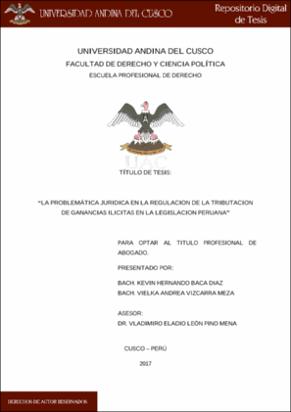| dc.contributor.advisor | León Pino Mena, Eladio Vladimiro | |
| dc.contributor.author | Baca Diaz, Kevin Hernando | |
| dc.contributor.author | Vizcarra Meza, Vielka Andrea | |
| dc.date.accessioned | 2017-11-29T14:54:51Z | |
| dc.date.available | 2017-11-29T14:54:51Z | |
| dc.date.issued | 2017 | |
| dc.identifier.uri | https://hdl.handle.net/20.500.12557/1122 | |
| dc.description.abstract | Es de conocimiento público que el Estado para sustentar los gastos públicos necesita contar con recuerdos económicos generados por actividades suficientemente amplias y sostenidas, en base a esta necesidad surge la Potestad Tributaria para poder crear tributos y así poder gravar manifestaciones de riqueza, esta manifestación de riqueza se puede generar de dos formas, licita o ilícitamente, y es así donde surge la problemática de la presente investigación, ¿se debe gravar o no incrementos patrimoniales de origen ilícito? Y ¿Por qué razones?.
Al respecto tanto el Tribunal Constitucional como el Tribunal Fiscal se han pronunciado a favor de la tributación de ganancias ilícitas, pues así lo demuestra la STC 4382 -2007-PA/TC emitida en fecha 12 de noviembre del 2007, entre otros. Sin embargo, ¿Estos se fundan en derecho y se encuentran motivadas correctamente? ¿La tributación de ganancias ilícitas tiene respaldo legal? ¿Está dentro de las potestades del legislador gravar rentas de este tipo? ¿Se afecta algún Principio del Derecho? ¿Cómo está regulada esta figura en otros países? Y finalmente, ¿Puede un Estado Democrático de Derecho como el nuestro, financiar sus gastos con recursos provenientes de actividades ilícitas y a su vez combatir la delincuencia? Dando respuesta a estas interrogantes, sostenemos que si bien es cierto se grava el Incremento Patrimonial NO Justificado de forma legal por medio de la Determinación sobre base Presunta, como un medio antielusivo y antidefraudatorio, no se debe abusar de las presunciones para recaudar impuestos de una actividad que no configura, tributo, ni obligación tributaria, ni es congruente con los principios del derecho tributario, ni las demás normas tributarias, en especial con el art. 1 de la LIR. Pues de su aplicación (gravar rentas de origen ilícito) se vulnera ostensiblemente los Principios de legalidad y Capacidad Contributiva, así como el derecho a probar, el principio de no confiscatoriedad, entre otros. | es_PE |
| dc.description.abstract | It is knowledged by everyone that the State support the public spending needs to have economic memories generated by sufficiently broad and sustained activities, based on this need arises the Tributary Power to be able to create taxes and this taxing manifestations of wealth, this manifestation of wealth can be generated in two ways, whether bidding or unlawful, and this is where the problem arises from the present investigation, whether or not to increase patrimonial increases of illicit origin? In this regard both the Constitutional Court and the Tax Court have ruled in favor of the taxation of illicit profits, as evidenced by STC 4382 -2007-PA / TC issued on November 12, 2007, among others. However, are these based on law and are they motivated correctly? Does the taxation of illicit profits have legal support? Is it within the powers of the legislature to tax revenues of this type? Is a Principle of Law affected? How is this figure regulated in other countries? And finally, can a Democratic State of Law such as ours, finance its expenses with resources derived from illicit activities and in turn combat crime?
Responding to these questions, we argue that while it is true that the Legally Increased NOT Legally Increased by means of the Presumptive Determination, as an anti-fraud and anti-refraudatory means, the presumptions to collect taxes from one Activity that does not constitute tax, nor tax liability, nor is it consistent with the principles of tax law, nor the other tax rules, especially with art. 1 of the LIR. Because of its application (tax income of illicit origin) ostensibly violates the Principles of Legality and Capacity for Contribution, as well as the right to prove, the principle of non-confiscatory, among others. | en_US |
| dc.description.uri | Tesis | es_PE |
| dc.format | application/pdf | es_PE |
| dc.language.iso | spa | es_PE |
| dc.publisher | Universidad Andina del Cusco | es_PE |
| dc.rights | info:eu-repo/semantics/openAccess | es_PE |
| dc.rights.uri | https://creativecommons.org/licenses/by-nc-nd/2.5/pe/ | es_PE |
| dc.source | Universidad Andina del Cusco | es_PE |
| dc.source | Repositorio Institucional - UAC | es_PE |
| dc.subject | Gasto público | es_PE |
| dc.subject | Potestad tributaria | es_PE |
| dc.subject | Tributación | es_PE |
| dc.subject | Ganancias ilícitas | es_PE |
| dc.title | La problemática jurídica en la regulación de la tributación de ganancias ilícitas en la legislación peruana. | es_PE |
| dc.type | info:eu-repo/semantics/bachelorThesis | es_PE |
| thesis.degree.name | Abogado | es_PE |
| thesis.degree.grantor | Universidad Andina del Cusco. Facultad de Derecho y Ciencia Política | es_PE |
| thesis.degree.level | Titulo Profesional | es_PE |
| thesis.degree.discipline | Derecho | es_PE |


